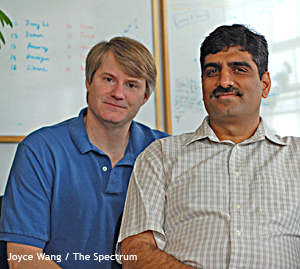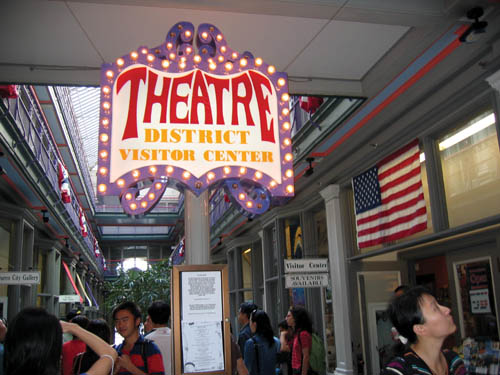|
Campus News
- OCTOBER 15th, 2007
Technology brings efficiency to airline security
KEELEY SHEEHAN - Staff Writer  | | Communications
professor Mark Frank and computer science and engineering professor
Venu Govindaraju have received a grant to develop a computer technology
that will allow for easier detection of terrorists and other criminals. |
UB
researchers have received a grant worth $800,000 from the National
Science Foundation for a computer technology project that could make
the current airport screening process more efficient.
Venu Govindaraju, a computer science and
engineering professor, and Mark Frank, a communication professor, are
combining computer programming with behavioral science to develop a
program that would record and analyze subtle movements of the human
face in real-time. The program would then alert airline officials of
passengers that might be of concern, particularly potential terrorists.
According to Govindaraju, there are certain
patterns in the way a person's eyes, eyebrows or corners of the mouth
normally move during conversation. When a person is nervous, anxious or
lying, these patterns are different.
"If the expressions are natural, there is one way
these (body parts) move. If they are not natural, they move slightly
different," he said.
According to Frank, after Sept. 11, every first
and thirteenth person in line at a security checkpoint and passengers
with one-way tickets were pulled aside for additional questioning.
"How do you go about figuring out whom to talk
to?" he said. "You're going to give people second screenings, but what
criteria do you use?"
Govindaraju added that the process has become much
like a game of musical chairs. Second screenings are done at random or
based on the gut feelings of airline officials.
"Current airport screening is random," he said.
"The (technology) will allow for it to be based on something more
scientific, rather than gut feeling."
Many raise the question of civilian rights when
looking at technology that, on the surface, can seem invasive; they
feel this means that Big Brother is watching them. Frank insists that
it does not.
"When you go to get on an airplane, you're already
giving up certain rights," he said. "You're allowing someone to search
your bags."
Frank explained that the project's aim is not to arrest people, but to improve the current screening system.
"The assumption is nobody gets secondary
screenings," Frank said. "But it does happen. The question is, how do
you go about figuring out who to talk to?"
He explained that examining expressions or body
language could be used to catch not only terrorists but also drug and
human smugglers, money launderers and people with false documents. Govindaraju noted that the project could have a use outside the airline industry as more than a criminal-catching device.
The recording system could also be put in cars. By
examining driver's expressions, it could alert drivers to when they are
drunk or too drowsy to drive.
Govindaraju also explained that the technology
could analyze the subtle facial movements of people who are paralyzed,
giving them a way to communicate without words or gestures.
"This could allow them to have a language," he said.
Govindaraju explained that the research is still in
the hypothesis stage, and the recent funding will allow them to explore
the potential of the technology.
"We can build a system, test it extensively and see if our hypothesis holds," he said.
| 



